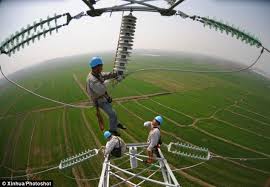Education programmes of job
Electrical Engineering Mechanical Power Engineering
Renewable Electrical Power Engineering

Nature of work
As an electrical engineer you may either be involved at every stage of design and development or you may just be involved at one particular stage depending on the organization that you are applying for. The following activities are usually common to many posts; however, the nature of your roles varies according to industry or sector. identifying customer requirements;
designing systems and products;
reading design specifications and technical drawings;
researching suitable solutions and estimating costs and timescales;
making models and prototypes of products using three-dimensional design software;
liaising with others in the design team;
liaising with clients and contractors;
attending meetings on site;
designing and conducting tests;
recording, analysing and interpreting test data;
proposing modifications and retesting products;
qualifying the final product or system;
servicing and maintaining equipment;
preparing product documentation, writing reports and giving presentations;
monitoring a product in use to improve on future design.
Environment of work
your working hours vary and are job-specific. Some jobs offer flexible working but be prepared to work extra and unsocial hours to meet deadlines or resolve design difficulties. You may be located in a production plant, workshop, office, laboratory, factory or on site, or possibly a mixture of several of these. You will work in comfortable offices most of the times. Conditions may be hot, dusty or cramped, though. Hopefully you like travelling because travel within working day is common and if you think of working in multinational organisations you may need to travel overseas . Also, when you work in oil, petrochemical and power sectors, large consulting firms and large building contractors, you will either apply for an overseas posting with a multinational employer or you may apply for a job based overseas . Women aren’t preferable to work in this career because they are still underrepresented in all areas of engineering. Self-employment and consultancy are possible if you had expertise and a good reputation within the profession . It would be normal to hold chartered engineer status before entering consultancy work. You are a lucky person if you like to work within a group because being an electrical engineer required to work in a multi-disciplinary project team most of the time which is likely to include engineers from other specialist areas as well as architects, marketing and sales staff, manufacturers, technicians and customer service personnel. You may also work with representatives from customer organizations. Typical starting salaries for graduates range from xxxxxxx-xxxxxxxx Professional life
Professional status and membership of the relevant professional body, e.g. order of Syrian engineers, is essential for successful career development. This will enable you to keep up to date with developing technologies, establish contacts, and network with other engineering professionals in your field and related fields at conferences and regional meetings.You will need four to five years after graduation to build up the necessary experience because Professional registration involves demonstrating competencies. Would you like to get Professional registration? So, you should be a commitment to continuing professional development (CPD) throughout your career.
As an electrical engineers there are no set or easily defined routes for your career progression. It can be a matter of choice and preferred specialist area. You may decide to stay in a purely engineering role or you may work in research and design (R&D), but other options include:
- going into project management;
- taking on a management role;
- an academic career;
- becoming a consultant or contractor.
As a graduate, in case you like to work for contracting firms, you would be expected to have a high degree of mobility.
Syrian engineering qualifications are recognised in most countries, in others you may have to take additional tests.
Getting the job
If you are considering applying for an Electrical Engineer position, then you have to get a degree in electrical or electronic engineering. Entry may also be possible with other engineering degrees, particularly mechanical engineering. Other relevant subject areas include:- computing and software engineering;
- mechanical and production engineering;
- electromechanical engineering;
- power and energy engineering;
- building services engineering;
- communications engineering;
- aeronautical engineering;
- physics and applied physics.
Diplomates with work or placement experience are advantages for accessing to this job. Sometimes you have a chance for entering to this career but you have to have a good experience. You do not need a postgraduate qualification to gain employment. A potential employer will be more impressed by your enthusiasm to gain professional status and by relevant industrial experience.
Skills
As a candidate you need to show evidence of the following skills: commercial awareness;
oral and written communication skills;
an enthusiasm for your subject and up-to-date sector knowledge;
planning and organisational skills, such as time and resource allocation;
the ability to work in a multidisciplinary team.
A second language could be useful when applying to international companies.
Sources and references
www.arab-eng.org www.syriaengineer.com
The Order of syrian engineers
www.prospects.ac.uk
Arab Standard Classification of Occupations, 2008, Ed. Arab Labor Organization
Summary
Your tasks as an electrical engineer are summarized by designing, developing and maintaining electrical control systems and/or components to required specifications, focusing on economy, safety, reliability, quality and sustainability.You will design and manufacture electrical equipment for use across many sectors, such as:
the building industry and services, including lighting, heating, ventilation, etc.;
transportation and transport networks;
manufacturing and construction;
production and distribution of power.
You may be involved in projects from the concept and detail of the design through to implementation, testing and handover. Also, you may be involved in maintenance programmes.
As an electrical engineer you need to project manage and multitask as well as technical knowledge. You also need to have commercial awareness. Additional attributes, such as team leadership or management skills, are required as careers progress.
